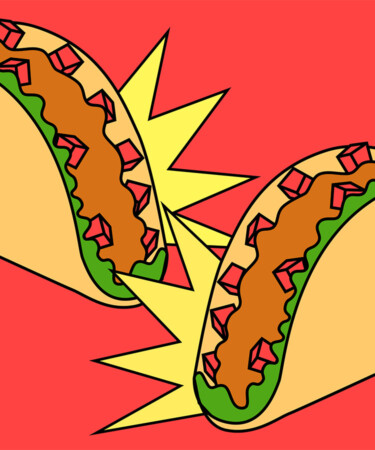This article is part of our Cocktail Chatter series, where we dive into the wild, weird, and wondrous corners of history to share over a cocktail and impress your friends.
If you’ve ever enjoyed a taco on the day of the week that falls between Monday and Wednesday, there’s a near-certainty that you’ve heard the phrase “Taco Tuesday.” Practically ubiquitous across kitchens and Mexican restaurants, Taco Tuesday has become a nationwide phenomenon not unlike that of “Margarita Monday” or even Sunday brunch. That’s why it may surprise you that if you’ve ever honored the tradition at a restaurant using the moniker, it may have been doing so illegally. Only two establishments in the entire nation actually have the go-ahead to celebrate Taco Tuesday officially — but Taco Bell is on a mission to change that.
Taco John’s, a taco chain operating approximately 400 locations in 23 states across the U.S., has boasted ownership of “Taco Tuesday” in 49 states since 1989. The story goes that in the ‘80s, it started selling two tacos for 99 cents on Tuesday nights in an effort to attract customers on the slowest day of the week. The promotion was dubbed “Taco Twosday,” and it was so successful that the chain changed the deal’s name to “Taco Tuesday” and filed for a trademark of the phrase. That trademark also became an integral part of the brand’s marketing. On its website, Taco John’s still proudly claims that it invented the phrase: “Ever hear of Taco Tuesday®? We started it! We even trademarked it. That’s how seriously we take tacos.”
There’s just one problem: technically, it didn’t. The only state that blocked Taco John’s trademark filing was New Jersey, where the same phrase has been owned by Gregory’s Restaurant & Bar in Somers Point since 1982. Coincidentally, Gregory’s also claims that it was the first to coin “Taco Tuesday.” In Taco Bell’s eyes, though, it doesn’t matter who invented the term — everyone should be able to use it freely. That’s why in May 2023, the international fast-food chain filed a legal petition to cancel the federal trademark registrations for “Taco Tuesday” owned by both establishments.
“People like tacos on Tuesdays. They just do. It’s even fun to say: ‘Taco Tuesday,’” the official filing with the United States Patent and Trademark Office (USPTO) reads. “But since 1989, entities associated with [Taco John’s and Gregory’s Restaurant & Bar] have owned a federal trademark for ‘Taco Tuesday.’ Not cool.”
Rather than filing for ownership, Taco Bell is merely seeking dissolution of the 1980s filings, arguing that “Taco Tuesday” is an incredibly generic term and “should belong to all who make, sell, eat, and celebrate tacos.” Along with its legal filings, Taco Bell also launched a petition on change.org entitled “Freeing Taco T***day,” inviting those who believe in democratizing the phrase to sign.
While it’s unlikely that the filings will be canceled anytime soon — as predicted on CNN by trademark attorney Josh Gerben based on previous federal rulings — it’s still possible that Taco Bell could win in the end. In 2019, NBA legend LeBron James made an attempt to federally trademark the phrase “Taco Tuesday,” but was blocked by the USPTO when it deemed it “a commonplace term, message, or expression widely used by a variety of sources.” Despite the failure to trademark, James’s legal team actually considered the process a victory, as refusal on the basis of commonality meant insulation from liability if the basketball star were to use “Taco Tuesday” in any of his professional ventures. Now, he’s joining Taco Bell’s fight. One week after the chain’s move to terminate the trademarks, James starred in its commercial campaign called “Taco Bleep,” which attempts to showcase the bizarre nature of the trademark and encourages taco lovers to sign the change.org petition.
“How can we tell our fans to Live Más if their favorite taco joints aren’t even allowed to freely say ‘Taco Tuesday?’” Taco Bell’s legal filing ponders. “Everything else is menos.”
